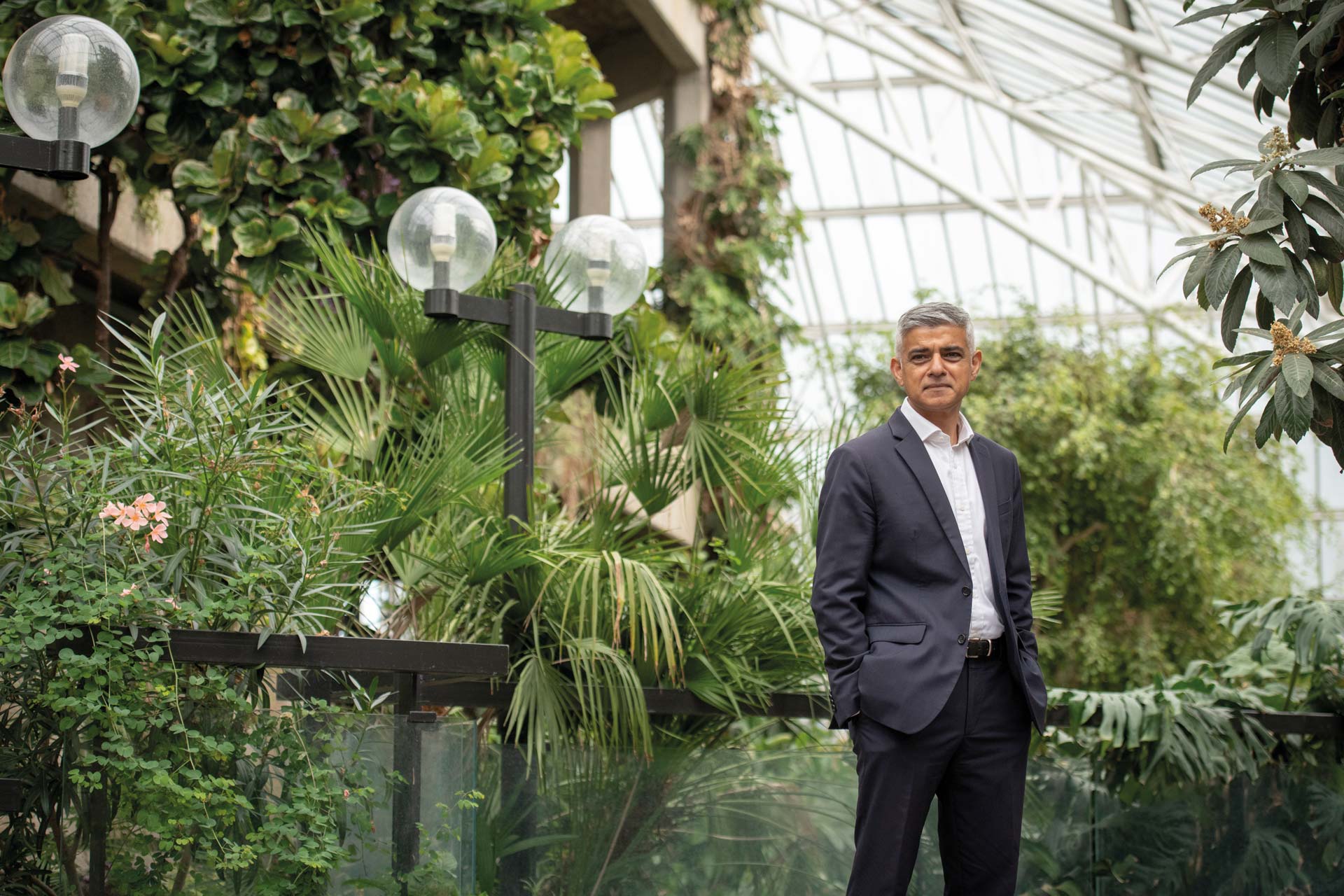
- HOME
- CULTURE
How Sadiq Khan Is Fighting Pollution For Londoners
He's on a mission to fix London's air pollution problem
By | 11 seconds ago
Love him or loathe him, London Mayor Sadiq Khan is dedicated to lowering pollution levels in our capital, says Charlotte Metcalfe.
Awhile ago, the actor Nigel Havers was on BBC Radio 4’s Broadcasting House show and the conversation turned to London’s traffic. Nigel claimed to be so fed up with Sadiq Khan’s restrictions and extension of the Ultra Low Emission Zone (ULEZ) that he considered leaving London. I took notice because I was reading Sadiq’s book Breathe: Tackling the Climate Emergency. Its publication came soon after 18 May when Tony Devenish, a London Assembly member, hauled Sadiq publicly over the coals, accusing him of failing Londoners as a mayor. That same month, Theresa Villiers, MP for Chipping Barnet, launched a bid to give the government powers to scrap Sadiq’s ‘anti car policies’, and less than four weeks after I talk to him, a YouGov poll found that 50 percent of Londoners think he’s doing a bad job. Sadiq is also lambasted mercilessly on Twitter and, although it may be a generational thing, when I ask around to find out what people think about him, many roll their eyes or say he’s doing a useless job. However, if his book is anything to go by, he’s made huge strides in improving London’s air quality. His detractors say that’s at the cost of more important issues like housing and crime, but nevertheless surely it’s of paramount importance to seek solutions to our capital’s dire congestion?

I start by asking him when he became so aware of the environment. ‘To be honest, it was self-interest,’ he says. ‘As a young lawyer I had a Saab convertible and then bought a Land Rover as I could fix my daughter’s car seat into it. I even voted for Heathrow’s third runway. I dismissed climate change as a tomorrow issue for the West, mostly affecting sub-Saharan Africa, islands in the West Indies and Bangladesh.’
Then, in 2014, Sadiq was diagnosed with asthma when training for the London Marathon. He met Rosamund Adoo-Kissi-Debrah, mother of Ella, who died in 2013 of an asthma attack soon after her ninth birthday and following 30 emergency hospital admissions over two years. No one in the medical profession saw a link between Ella’s death and the congested South Circular near where she lived, but after Rosamund waged a dogged campaign, an inquest in December 2020 concluded that nitrogen dioxide levels on that road had way exceeded legal levels and WHO recommendations. ‘Clean air should be a human right and Rosamund was the inspiration who triggered my transformation from Land Rover driver to electric bike evangelist,’ says Sadiq.
He’s frustrated that his determination to curb our emissions meet with such heavy opposition from all quarters. LTN (Low Traffic Neighbourhood) schemes are particularly unpopular, with claims that traffic is being brought to a standstill on many roads making air quality even worse for some locals. In his book, Sadiq describes being confronted at his nephew’s barbecue by Michael, an electrician who relied on his diesel van and whose costs had
soared by £60 a week because of Sadiq’s policies. ‘He had a point,’ says Sadiq. ‘If we weren’t careful, these costs could fall disproportionately on the shoulders of the poorest. So, we invested in the biggest scrappage scheme in
history and offered small business loans to help meet those costs.’ He points out that one in ten vehicles in Kensington and Chelsea is a Range Rover, whereas half the people living in Barking and Dagenham don’t own a car at all. Yet it’s the deprived boroughs where air is poorest. He understands the need to address the economic impact of his policies, and brought in the visionary economist Mariana Mazzucato to help come up with a Green New Deal to grow London’s green economy to accelerate job creation.
While we revere David Attenborough for urging us to avert climate breakdown, many despise Sadiq for trying to do just that. How does he cope with such vicious, often personal, antipathy? ‘I’ve dealt with bullies since the playground,’ he says. ‘I’ve never allowed them to win, and never will. The problem with the pollution crisis is that it’s invisible. People can’t see or smell it so they don’t know how dangerous it is. That’s why I wrote the book, as I can’t explain it in 140 Twitter characters. Politicians dodge the issue because climate change doesn’t seem urgent so it’s not a vote winner, and you can only motivate people if you persuade them that it’s in their own interests to tackle it.
‘Already we’ve achieved so much, so I’m not stopping now. The number of asthmatic children being admitted to hospitals has reduced by a third. In 2017 60 percent of cars in inner London were polluting, whereas now 94 per cent are compliant with regulations. We have so many more cycle lanes and 900 rapid 15-minute charging points, more than any other city in Western Europe.’
His book relates several events I was unaware of, such as escaping the emergency ward where he’d been admitted with a suspected heart attack, to address COP at Glasgow. He confesses he lied to doctors, promising them he’d rest, in order to deliver his speech. I was also impressed by his involvement and subsequent chairmanship of C40, a partnership of mayors from 96 world cities. He’s still C40’s Chair and is convinced that mayors can collaboratively make a real difference to tackling urban pollution because they understand the problems of their cities better than anyone.

Sadiq’s book Breathe is out now
Despite his achievements, the polls remain fairly dismal. ‘The only poll that ultimately matters is the election itself,’ Sadiq counters robustly. ‘I’m confident if people understand what I’m trying to do, they’ll back me. Between 2000 and 2018 London’s workplace greenhouse gas emissions reduced by 57 percent and home emissions by 40 percent – but cars by just seven percent. People might not like it, but we must reduce our driving in the city, or risk more Ellas. I’ll send Nigel Havers my book and hope he reads it. Isn’t it better to be the first generation to take action rather than the last generation not to get it right? And there’s so much more we still have to do.’
Breathe: Tackling the Climate Emergency (£16.99, Penguin) is out now






